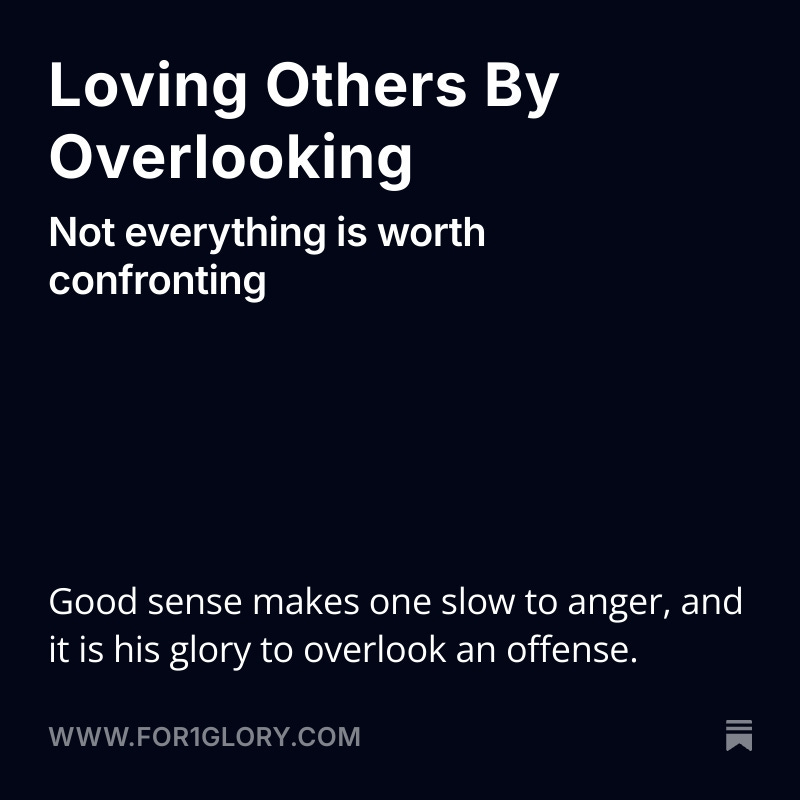Loving Others By Overlooking
Not everything is worth confronting
One day at work, I was informed that I would be featured as the highlighted employee in our monthly newsletter. They had me fill out a form that asked basic questions about myself. One question was, “What would you advise coworkers?” With over two decades of being with the company, I had a lot to think about. A significant piece of advice that I wrote was “To be gracious with your co-workers, as you never know what they might be going through““.
I was surprised by the feedback!
So many people thanked me for mentioning that or simply said, ”Well said” with the overtone of approval. I liken that to an unbeliever’s rendition of a believer’s shouting “AMEN” at the sermon points in church.
“What Did She Mean By That?
Sometimes, we can find ourselves overly attuned to the words and actions of those around us, letting them seep too deeply into our hearts.
There are times that people’s actions or words are not all about us. Sometimes, other things are going on with them that can “trigger them.” We all have bad days, weeks, or seasons.
Rudeness can offend us and even provoke us. Yet to meet flawed people’s actions, words, or intentions with a gracious love is the key to this verse’s use of good sense. It is good sense to cover this interaction with a love that gives them the benefit of the doubt and thinks the best of the person. It is good sense to be responding in love. Love is both patient (slow to anger) and kind (see 1 Cor. 13:4-5). It is good sense to consider where such an outburst may originate from, before retaliating in an irritable or resentful manner of our own doing.
And yes, if something on our behalf has caused such actions or attitudes we need fess up to it. Take the log out of your own eye. (See Matthew 7:3-5) There is a balance between times when we need to confront and times when we need to overlook. Yet, for this brief essay, my emphasis is to encourage the path of overlooking an offense, thereby loving others better.
The Path of Overlooking
The path to having such a gracious and mature heart toward others is rooted in the gracious love the Father has exhibited in our lives.
In Jesus’ parable of the unforgiving servant, he stresses this point. (See Matthew 18:21-35) The master overlooked his servant's great debt. But did the servant overlook his fellow servant's smaller debt?
Well, he should’ve. The king said, "Should not you have had mercy on your fellow servant as I have mercy on you?”(v.33) Oh, how quick the servant forgets the good mercy and grace he had received.
Yet this happens to us, too.
God’s divine mercy should change our hearts to be merciful. God’s grace should make us more gracious.
If you need an example of how the gospel works in our lives, or you might be asking, “Why should I be more gracious and merciful in this situation?” Consider this:
A heart change that overlooks an offense will, at times, spotlight our character and bring honor and glory to us. You see, by being slow to anger and overlooking an offense, we can be perceived as the more mature individuals, those who have chosen to take the high road..
Yet
Internally, we know that we are to reflect the work of Christ in our lives, which has formed our hearts to change. He has been abundantly gracious. We have been humbled by God, who forgives and overlooks our shortcomings, sins, and faults. This glorifies God’s goodness in my life. Not my goodness. So when others ask “why,” we overlook, forgive, and are merciful; we are to share about God’s work of love and forgiveness in our lives. His actions toward us are what make us love others better.
Yep, that glorifies God! Which is what our purpose in life is all about.
To overlook with such a motive is counterintuitive to our fleshly reaction and the world’s expectant response. We should resist our flesh’s desire and the world’s temptation toward that intuition to sin.
That means we are to behave lovingly as Spirit-filled, Bible-believing Christians who turn the other cheek. We are to overlook the offense by trusting God to work out justice on our behalf. (Matthew 5:39, Romans 12:19),
So how do we get there? This always starts with a prayerful campaign on our knees. It takes an internal work of the Spirit’s tending to your heart and its pulls and sway over your thoughts and attitudes towards others. Pray, repent, and remember that “human anger does not produce the righteousness of God.” (James 1:20 ESV). Only Christ produces the righteousness of God like that for us. Lean heavily into letting the grace of God you’ve experienced in your life. It is what sets the path for how you will be gracious to others in your behavior.



